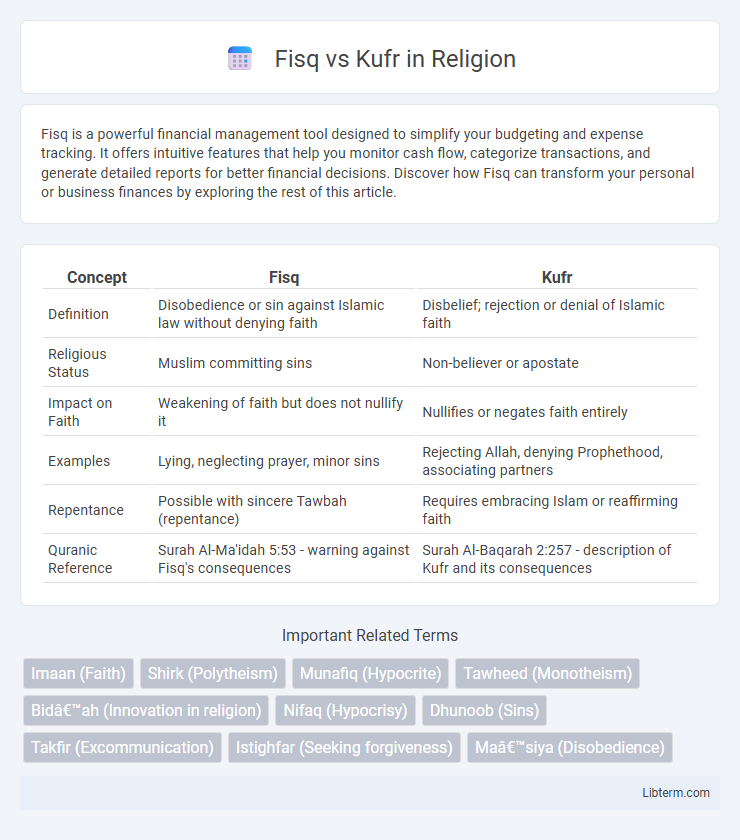Fisq is a powerful financial management tool designed to simplify your budgeting and expense tracking. It offers intuitive features that help you monitor cash flow, categorize transactions, and generate detailed reports for better financial decisions. Discover how Fisq can transform your personal or business finances by exploring the rest of this article.
Table of Comparison
| Concept | Fisq | Kufr |
|---|---|---|
| Definition | Disobedience or sin against Islamic law without denying faith | Disbelief; rejection or denial of Islamic faith |
| Religious Status | Muslim committing sins | Non-believer or apostate |
| Impact on Faith | Weakening of faith but does not nullify it | Nullifies or negates faith entirely |
| Examples | Lying, neglecting prayer, minor sins | Rejecting Allah, denying Prophethood, associating partners |
| Repentance | Possible with sincere Tawbah (repentance) | Requires embracing Islam or reaffirming faith |
| Quranic Reference | Surah Al-Ma'idah 5:53 - warning against Fisq's consequences | Surah Al-Baqarah 2:257 - description of Kufr and its consequences |
Understanding Fisq and Kufr: Definitions and Origins
Fisq refers to deliberate disobedience to Allah's commands, often manifesting as sinful acts that break moral and religious laws, stemming from the Arabic root "fasq," meaning to deviate or transgress. Kufr, derived from the root "kafara," signifies disbelief or rejection of fundamental Islamic faith principles, encompassing acts like denial of God's existence or rejection of Prophethood. Understanding these terms requires recognizing Fisq as moral corruption within faith, while Kufr represents an outright denial or repudiation of faith itself.
Key Differences Between Fisq and Kufr
Fisq refers to openly committing sins or moral corruption while still acknowledging the core tenets of Islam, whereas Kufr denotes outright disbelief or rejection of fundamental Islamic beliefs. Fisq affects a person's faith status by demonstrating disobedience yet retaining Iman, while Kufr results in the loss of Iman and expulsion from the fold of Islam. The key difference lies in Fisq being a transgression within faith boundaries, whereas Kufr represents a complete denial of faith essentials.
Quranic References to Fisq and Kufr
Fisq and Kufr are key concepts in the Quran, highlighting distinct states of disobedience and disbelief. The Quran describes Fisq as deliberate transgression against Allah's commands (Surah Al-Baqarah 2:27), representing sinful behavior that undermines faith but does not equate to outright rejection of God. Kufr, referenced extensively in Surah Al-Kafirun (109) and Surah Al-Baqarah (2:6-7), denotes outright denial and rejection of Allah's existence and message, characterized by disbelief and ingratitude, which leads to spiritual ruin.
Examples of Fisq in Islamic Teachings
Fisq in Islamic teachings refers to acts of blatant disobedience to Allah's commands, such as lying, theft, and neglecting obligatory prayers, which directly contravene the principles of faith. Examples include consuming interest (riba), engaging in corruption, and committing zina (fornication or adultery), all of which erode a believer's spiritual integrity and social harmony. These actions contrast with kufr, which denotes outright disbelief or rejection of faith, highlighting the gradation of moral failings in Islam.
Examples of Kufr in Islamic Teachings
Examples of Kufr in Islamic teachings include the denial of the existence of Allah, rejection of the prophethood of Muhammad, and associating partners with Allah (shirk). Acts such as disbelief in the afterlife, ignoring the Quranic revelations, and mocking the sacred tenets also constitute Kufr. These behaviors contrast with Fisq, which refers to sinful but not necessarily disbelief-related actions, emphasizing the gravity of Kufr in Islamic doctrine.
The Spiritual Consequences of Fisq
Fisq represents deliberate disobedience to Allah's commands, leading to spiritual decay and estrangement from divine mercy. Persistent engagement in fisq dulls the heart, obstructs repentance, and deepens one's alienation from Allah's guidance. This spiritual corrosion ultimately jeopardizes the soul's salvation and eternal peace in the hereafter.
The Spiritual Consequences of Kufr
Kufr, representing disbelief and rejection of divine guidance, leads to severe spiritual consequences including estrangement from Allah and loss of inner peace. Unlike fisq, which denotes sinful disobedience but acknowledges faith, kufr fundamentally severs the believer's connection with God's mercy and grace. This spiritual void results in eternal consequences in the afterlife, emphasizing the critical importance of faith and submission in Islamic theology.
Repentance and Redemption from Fisq and Kufr
Fisq, referring to sinful disobedience, and kufr, signifying disbelief or rejection of faith, both necessitate sincere repentance for redemption. Genuine repentance (tawbah) involves remorse, immediate cessation of the sinful act, and a firm resolve not to return to fisq or kufr behaviors. Redemption from fisq and kufr is achieved through Allah's mercy, sincere supplication, and reforming one's beliefs and actions, reaffirming faith and righteousness.
Fisq vs Kufr: Impact on Islamic Jurisprudence
Fisq refers to sinful disobedience against Islamic commands, while Kufr denotes outright disbelief or rejection of faith. The distinction between fisq and kufr significantly shapes Islamic jurisprudence by determining the severity of legal and social consequences for individuals; fisq often leads to disciplinary punishments, whereas kufr may result in apostasy rulings and loss of Muslim identity. Understanding these concepts is crucial for scholars when issuing fatwas, as they influence the application of Sharia in matters of faith, community cohesion, and individual accountability.
Contemporary Relevance of Fisq and Kufr
Fisq and Kufr remain highly relevant in contemporary Islamic discourse, addressing issues of moral corruption and rejection of faith in modern societies. The concept of Fisq highlights behaviors that deviate from Islamic ethical standards, impacting social justice and personal accountability. Kufr, as the denial or disbelief in fundamental tenets, continues to influence theological debates and identity politics within Muslim communities worldwide.
Fisq Infographic

 libterm.com
libterm.com